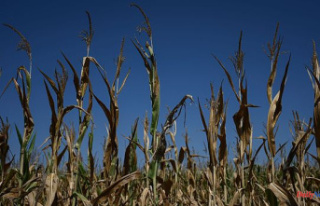If we ignore the rubble that dots the street, this scene could take place in many European cities. But Okhtyrka, in northeastern Ukraine, is not a place like any other.
As towns and villages in this region near the Russian border fell like skittles during the invasion by Moscow forces launched on February 24, this town of 48,000 inhabitants located on the Vorskla river said "niet" .
Elsewhere, civilian deaths soared in the first weeks of the war, with more than 50 people killed in the battle for the nearby, much smaller town of Trostianets, for example.
The mayor of Okhtyrka, Pavlo Kouzmenko, explains that he managed to leave his constituents free and relatively safe while keeping a cool head.
"Only 18 civilians died. I don't want to brag, but it's thanks to the city administration, the volunteers, the people who stayed in the shelters," he told AFP. The "greatest challenge" was to avoid panic, which would have "ruined the defense of the city".
A column of Russian tanks swept over Okhtyrka on the first day of the invasion, February 24, with the intention of capturing it and moving towards the capital, kyiv. "They thought they would pass very quickly," recalls Mr. Kouzmenko.
- A month of siege -
The mayor -- suddenly propelled to the top of the command hierarchy, with regional officials either undecided or unavailable -- has decided that this incursion by Russian troops will not pass.
Mr Kouzmenko took the lead in an immediate response that saw Ukrainian troops force a hasty retreat from their opponents, who left behind tanks and other equipment.
A month-long siege followed, with the Russians bombarding the city almost daily with Hurricane, Smertch and Grad rockets and destroying the town hall, a shopping mall, water and sewage systems, a depot fuel and the local thermal power station.
They also killed at least 70 Ukrainian soldiers at a military base with a thermobaric bomb, according to Ukraine's ambassador to the United States.
The NGO Amnesty International for its part evoked an attack with cluster bombs on a nursery school, the second day of the siege, which killed three people, including a child.
Other destroyed buildings include the 108-year-old local cultural center, which was attacked in a nighttime bombardment on March 8.
Center director Tetyana Bartchenko, 59, holds back tears as she relives the missile launch that robbed the community of its beating heart.
But, like many residents with whom AFP spoke, she is full of confidence and gratitude towards the Ukrainian soldiers.
"This city was never taken, and it's thanks to the army, thanks to the territorial defense forces, and thanks to the patriotism of the citizens," she says.
- "Hero city" -
After a month of encirclement, the Russian troops retreated, as in other regions, on March 26.
Ukrainian President Volodymyr Zelensky has named Okhtyrka a "hero city", an honorary title awarded only to another city in the northeast, Kharkiv.
The population dipped to 20,000 at the height of the fighting, with the town helping around 1,000 people a day to flee, but has now returned to near the original number.
Nina Kolot, retired, explains the cooperation that had been established between civilians and Ukrainian troops entrenched a few meters from their homes.
"They were there, they were fighting for the city and we were helping them - by preparing food," the 70-year-old told AFP. "It's thanks to the soldiers that we stayed safe."
A recent resumption of shelling has residents fearing that the Russians may soon return, but Mayor Pavlo Kouzmenko remains confident.
If he admits this eventuality, even weak, he assures that the Russians can carry out only strikes here, but not to seize the cities. "They can hold a few small villages, but they need resources and they have fewer every day."












